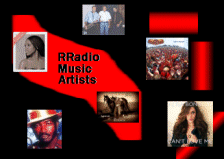| Friday, January 18, 2013 |  |
A New Breed of Indie Artists
 |
 |
 |
 |
 |
 |
 |
 
 
 |
 |


 Free Music and Programs for Radio and Podasters
Free Music and Programs for Radio and PodastersUsing an Artist Signing Service for Radio
|
For anyone keeping an eye on music, it comes as no surprise that the biggest emerging issue since the growth of Rock and Roll is shaping up with news of Apple moving into streaming. |
"It's time for a radically different music distribution system." |
Of course, we have radio industry trades all echoing the same "OMG! Pandora's in Trouble" headline. Ironically, none discusses how this move will affect the radio industry at large - which I find strange and telling.
Strange because, as it grows older, the Apple generation will embrace what this mega-company is putting in front of it. Apple aficionados have done so since they sat in front of computers the company donated to their elementary schools.
Telling, due to the "head in the sand" defense which continues in radio. It's a replay of the Mad Magazine slug line: "What, me worry?" But that approach quit working awhile ago.
We had the radio industry devoting days of coverage to Pandora's increasing AQH reports. Now we have a company with deep roots in audio moving into streaming music, so you'd think radio execs would/should be a little concerned how this will impact their future. You'd think there'd be at least as many articles on this as addressed the Pandara issue.
Go try to find a story in a radio industry publication about how Apple's move to streaming will effect radio. I'll save you the time - there aren't any.
What you will find, repeatedly, is an item about Apple cutting deals directly with record companies and bypassing high royalty rates. It's a grand plan that works well when you have one gigantic company calling each record label to say: "We have iTunes, iPads, and iPhones. If you want a piece of how much they can sell, here's what you're going to do."
The radio industry doesn't have that luxury, though. Truth be told, radio has little luxury thanks (in part) to the "I'd rather cut my throat than negotiate on this" comment from one-time NAB Executive, David Rher.
The royalty deal currently in place expires in 2015, with radio having to pay $2.50 for each 1,000 times a song is heard online. What happens after that is anyone's guess. As for the over-the-air fight for royalties, anyone who thinks this is a past issue needs to do some research on the record labels' persistence.
Is there an out? Yes, and it is similar to Apple's approach of signing deals with the labels. More precisely, it revolves around signing directly with music groups that are featured on radio.
As with many internet related exercises - aggregation of audience for advertising sales, analytics and metrics, surveying of online listeners, etc. - Audio Graphics is a pioneer in the field of artists signing waivers. RRadio Music is a systematic way for internet radio stations to play music free. It features individual songs and genre specific programs, compiled from quality music that comes from artists who haved signed a waiver (for the exposure radio airplay brings).
Our latest program series are in Soft Rock, Hard Rock, and Dance genres. But you can also select programs in Country, Hip Hop & Rap, Jazz, and Pop.
Looking for individual songs? Go through the RRadio Music library, and select all that you desire. Each artist has signed a waiver giving you permission to play their songs online without making payment of any kind. Each artist has been qualified for quality.
It's time for a radically different music distribution system.
With Pandora, Slacker, and now Apple moving into music programming, how do you suppose the radio industry is going to counter these efforts? Is it conceivable for each record label to strike a deal with each radio group? (Not if you have any idea how difficult the labels are in negotiations.)
An answer is required prior to the expiration of that royalties deal in 2015. When the next round of royalty rate increases take effect, many in the radio industry will wish they had slit their throats instead of trying to negotiate their way out of this royalty mess.
Apple always seems to make the right moves. It's time for the radio industry to follow.
Give artists signed waivers a try. It's time the radio industry tries a different approach to music distribution!
More
 |
 |
 |
comments by Disqus |







